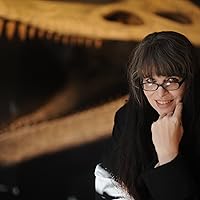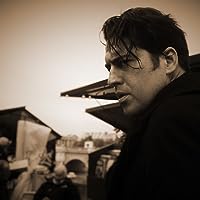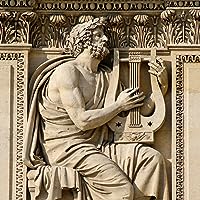Odysseus Quotes
Quotes tagged as "odysseus"
Showing 1-30 of 59

“What is admired in one generation is abhorred in another. We cannot say who will survive the holocaust of memory… We are men only, a brief flare of the torch.”
― The Song of Achilles
― The Song of Achilles

“The Cyclops was about to roll the stone back into place, when from somewhere outside Annabeth shouted, "Hello, ugly!"
Polyphemus stiffened. "Who said that?"
"Nobody!" Annabeth yelled.
That got exactl;y the reaction she'd been hoping for. The monster's face turned red with rage.
"Nobody!" Polyphemus yelled back. "I remember you!"
"You're too stupid to remember anybody," Annabeth taunted. "Much less Nobody."
I hoped to the gods she was already moving when she said that, because Polyphemus bellowed furiously, grabbed the nearest boulder (which happened to be his front door) and threw it toward the sound of Annabeth's voice. I heard the rock smash into a thousand fragments.
To a terrible moment, there was silence. Then Annabeth shouted, "You haven't learned to throw any better, either!"
Polyphemus howled. "Come here! Let me kill you, Nobody!"
"You can't kill Nobody, you stupid oaf," she taunted. "Come find me!"
Polyphemus barreled down the hill toward her voice.
Now, the "Nobody" thing would have confused anybody, but Annabeth had explained to me that it was the name Odysseus had used to trick Polyphemus centuries ago, right before he poked the Cyclops's eye out with a large hot stick. Annabeth had figured Polyphemus would still have a grudge about that name, and she was right. In his frenzy to find his old enemy, he forgot about resealing the cave entrance. Apparently, he did even stop to consider that Annabeth's voice was female, whereas the first Nobody had been male. On the other hand, he'd wanted to marry Grover, so he couldn't have been all that bright about the whole male/female thing.
I just hoped Annabeth could stay alive and keep distracting him long enough for me to find Grover and Clarisse.”
― The Sea of Monsters
Polyphemus stiffened. "Who said that?"
"Nobody!" Annabeth yelled.
That got exactl;y the reaction she'd been hoping for. The monster's face turned red with rage.
"Nobody!" Polyphemus yelled back. "I remember you!"
"You're too stupid to remember anybody," Annabeth taunted. "Much less Nobody."
I hoped to the gods she was already moving when she said that, because Polyphemus bellowed furiously, grabbed the nearest boulder (which happened to be his front door) and threw it toward the sound of Annabeth's voice. I heard the rock smash into a thousand fragments.
To a terrible moment, there was silence. Then Annabeth shouted, "You haven't learned to throw any better, either!"
Polyphemus howled. "Come here! Let me kill you, Nobody!"
"You can't kill Nobody, you stupid oaf," she taunted. "Come find me!"
Polyphemus barreled down the hill toward her voice.
Now, the "Nobody" thing would have confused anybody, but Annabeth had explained to me that it was the name Odysseus had used to trick Polyphemus centuries ago, right before he poked the Cyclops's eye out with a large hot stick. Annabeth had figured Polyphemus would still have a grudge about that name, and she was right. In his frenzy to find his old enemy, he forgot about resealing the cave entrance. Apparently, he did even stop to consider that Annabeth's voice was female, whereas the first Nobody had been male. On the other hand, he'd wanted to marry Grover, so he couldn't have been all that bright about the whole male/female thing.
I just hoped Annabeth could stay alive and keep distracting him long enough for me to find Grover and Clarisse.”
― The Sea of Monsters

“There's always a siren, singing you to shipwreck. Some of us may be more susceptible than others are, but there's always a siren. It may be with us all our lives, or it may be many years or decades before we find it or it finds us. But when it does find us, if we're lucky we're Odysseus tied up to the ship's mast, hearing the song with perfect clarity, but ferried to safety by a crew whose ears have been plugged with beeswax. If we're not at all lucky, we're another sort of sailor stepping off the deck to drown in the sea.”
― The Drowning Girl
― The Drowning Girl

“Penelope
In the pathway of the sun,
In the footsteps of the breeze,
Where the world and sky are one,
He shall ride the silver seas,
He shall cut the glittering wave.
I shall sit at home, and rock;
Rise, to heed a neighbor's knock;
Brew my tea, and snip my thread;
Bleach the linen for my bed.
They will call him brave.”
―
In the pathway of the sun,
In the footsteps of the breeze,
Where the world and sky are one,
He shall ride the silver seas,
He shall cut the glittering wave.
I shall sit at home, and rock;
Rise, to heed a neighbor's knock;
Brew my tea, and snip my thread;
Bleach the linen for my bed.
They will call him brave.”
―

“I'm not ashamed of heroic ambitions. If man and woman can only dance upon this earth for a few countable turns of the sun... let each of us be an Artemis, Odysseus, or Zeus... Aphrodite to the extent of the will of each one.”
― Rooftop Soliloquy
― Rooftop Soliloquy

“As you set out on your journey to Ithaca,
pray that your journey be a long one,
filled with adventure, filled with discovery.
Laestrygonians and Cyclopes,
the angry Poseidon--do not fear them:
you'll never find such things on your way
unless your sight is set high, unless a rare
excitement stirs your spirit and your body.
The Laestrygonians and Cyclopes,
the savage Poseidon--you won't meet them
so long as you do not admit them to your soul,
as long as your soul does not set them before you.
Pray that your road is a long one.
May there be many summer mornings
when with what pleasure, with what joy,
you enter harbors never seen before.
May you stop at Phoenician stations of trade to buy fine things,
mother of pearl and coral, amber and ebony,
and voluptuous perfumes of every kind--
buy as many voluptuous perfumes as you can.
And may you go to many Egyptian cities
to learn and learn from those who know.
Always keep Ithaca in your mind.
You are destined to arrive there.
But don't hurry your journey at all.
Far better if it takes many years,
and if you are old when you anchor at the island,
rich with all you have gained on the way,
not expecting that Ithaca will give you wealth.
Ithaca has given you a beautiful journey.
Without her you would never have set out.
She has no more left to give you.
And if you find her poor, Ithaca has not mocked you.
As wise as you have become, so filled with experience,
you will have understood what these Ithacas signify.”
― Classical Myth
pray that your journey be a long one,
filled with adventure, filled with discovery.
Laestrygonians and Cyclopes,
the angry Poseidon--do not fear them:
you'll never find such things on your way
unless your sight is set high, unless a rare
excitement stirs your spirit and your body.
The Laestrygonians and Cyclopes,
the savage Poseidon--you won't meet them
so long as you do not admit them to your soul,
as long as your soul does not set them before you.
Pray that your road is a long one.
May there be many summer mornings
when with what pleasure, with what joy,
you enter harbors never seen before.
May you stop at Phoenician stations of trade to buy fine things,
mother of pearl and coral, amber and ebony,
and voluptuous perfumes of every kind--
buy as many voluptuous perfumes as you can.
And may you go to many Egyptian cities
to learn and learn from those who know.
Always keep Ithaca in your mind.
You are destined to arrive there.
But don't hurry your journey at all.
Far better if it takes many years,
and if you are old when you anchor at the island,
rich with all you have gained on the way,
not expecting that Ithaca will give you wealth.
Ithaca has given you a beautiful journey.
Without her you would never have set out.
She has no more left to give you.
And if you find her poor, Ithaca has not mocked you.
As wise as you have become, so filled with experience,
you will have understood what these Ithacas signify.”
― Classical Myth

“Odysseus...sleeps sound beside Calypso and when he wakes thinks only of Penelope.”
― Watership Down
― Watership Down

“Daedalus had said to me once: Even the best iron grows brittle with too much beating.”
― Circe
― Circe

“In a time of disorder [Laertes] has returned to the care of the earth, the foundation of life and hope. And Odysseus finds him in an act emblematic of the best and most responsible kind of agriculture: an old man caring for a young tree.”
― The Art of the Commonplace: The Agrarian Essays
― The Art of the Commonplace: The Agrarian Essays

“He did not appear to be a very tall man; what I could see of legs seemed stumpy, though heavily muscled. His chest was broad and deep. Later I learned that he swam in the sea almost every morning. His thick strong arms were circled with leather wristbands and a bronze armlet above his left elbow that gleamed with polished onyx and lapis lazuli... Puckered white scars from old wounds stood out against the dark skin of his arms, parting the black hairs like roads through a forest... Odysseos wore a sleeveless tunic, his legs and feet bare, but he had thrown a lamb's fleece across his wide shoulders. His face was thickly bearded with dark curly hair that showed a trace of grey. His heavy mop of ringlets came down to his shoulders and across his forehead almost down to his black eyebrows. Those eyes were as grey as the sea outside on this rainy afternoon, probing, searching, judging.”
―
―

“Excellent. One tent's enough, I hope? I've heard that you prefer to share. Rooms and bedrolls both, they say.”
― The Song of Achilles
― The Song of Achilles
“Would that the dead were not dead! But there is grass that must be eaten, pellets that must be chewed, (...) holes that must be dug, sleep that must be slept. Odysseus brings not one man to shore with him. Yet he sleeps sound beside Calypso and when he wakes thinks only of Penelope.”
― Watership Down
― Watership Down

“And so, Athene, the prayer I offer is this: thank you for bringing my husband home, if that is what you have done. If the man who sleeps upstairs in the bed he once carved from an old olive tree is an impostor, I suppose I will find out soon enough. He knows the old stories of our marriage, of that I am certain. And Telemachus is devoted to him, which is fortunate. So perhaps it does not matter if he is the man who left, or a changed man, or even another man altogether. He fits in the space that Odysseus left."
- Your devoted Penelope”
― A Thousand Ships
- Your devoted Penelope”
― A Thousand Ships

“I knew he spoke not of his death, but of the nightmare Odysseus had spun, the loss of his brilliance, the withering of his grace. I had seen the joy he took in his own skill, the roaring vitality that was always just beneath the surface. Who was he if not miraculous, and radiant? Who was he if not destined for fame?”
― The Song of Achilles
― The Song of Achilles

“He's going to Troy to kill men, not rescue them...He is a weapon, a killer. Do not forget it. You can use a spear as a walking stick, but that will not change its nature.”
― The Song of Achilles
― The Song of Achilles

“You are holding us here, Achilles. You were given a choice and you chose. You must live by it now.”
― The Song of Achilles
― The Song of Achilles

“But fame is a strange thing. Some men gain glory after they die, while others fade. What is admired in one generation is abhorred in another...We cannot say who will survive the holocaust of memory. Who knows?...Perhaps one day even I will be famous. Perhaps more famous than you.'
'I doubt it.'
Odysseus shrugs. 'We cannot say. We are men only, a brief flare of the torch. Those to come may raise us or lower us as they please. Patroclus may be such as will rise in the future.'
'He is not.”
― The Song of Achilles
'I doubt it.'
Odysseus shrugs. 'We cannot say. We are men only, a brief flare of the torch. Those to come may raise us or lower us as they please. Patroclus may be such as will rise in the future.'
'He is not.”
― The Song of Achilles

“Living with him was like standing beside the sea. Each day a different colour, a different foam-capped height, but always the same restless intensity pulling towards the horizon.”
― Circe
― Circe

“Odysseus, son of Laertes, the great traveller, prince of wiles and tricks and a thousand ways. He showed me his scars, and in return let me pretend that I had none.”
― Circe
― Circe

“But Athena had no babe, and she never would. Her only love was reason. And that has never been the same as reason.”
― Circe
― Circe

“I may never know
if you are my Theseus or Odysseus
but call me Penelope for my heart
remains steadfast in its fidelity, ' (p. 46)”
―
if you are my Theseus or Odysseus
but call me Penelope for my heart
remains steadfast in its fidelity, ' (p. 46)”
―
“Wouldn’t you like to see the dead, just as the most special children do? Wouldn’t you like to converse with the departed and learn their secrets? Odysseus managed it. So can all of us. We can all get on the black ship and sail across Oceanus to Cimmeria, where we will find the land of dreams and its astounding neighbor, the land of the dead. We are a divine species. Isn’t it about time we became gods? What are we waiting for?”
― Children See Dead People: Children's Spooky Powers
― Children See Dead People: Children's Spooky Powers
“the successfully protective man in Sicily or Andalusia garners praise through courageous feats and gains renown for himself as an individual. This inseparable functional linkage of personal and group benefit is one of the most ancient moral notions found in the Mediterranean civilizations. One finds it already in ancient seafaring Greece in the voyager Odysseus. His very name, from odyne (the ability to cause pain and the readiness to do so), implies a willingness to expose oneself to conflict, risk, and trouble and to strive against overwhelming odds in order to achieve great exploits”
― Manhood in the Making: Cultural Concepts of Masculinity
― Manhood in the Making: Cultural Concepts of Masculinity
“Essentially, he can be described by the Greek word sophron (though the word is not Homeric). This is untranslatable. It means, not necessarily that you have superior brains, but that you make maximum use of whatever brains you have got. Odysseus is the antithesis of Achilleus. Achilleus has a fine intelligence, but passion clouds it; Odysseus has strong passions, but his intelligence keeps them under control. Achilleus, Hektor, and Agamemnon, magnificent as they are, are flawed with uncertainty and can act on confused motives; Odysseus never. So those three are tragic heroes, but Odysseus, less magnificent but a complete man, is the hero of his own romantic comedy, the Return of Odysseus, or Odyssey.”
― The Iliad of Homer
― The Iliad of Homer
All Quotes
|
My Quotes
|
Add A Quote
Browse By Tag
- Love Quotes 97.5k
- Life Quotes 76k
- Inspirational Quotes 73k
- Humor Quotes 44k
- Philosophy Quotes 29.5k
- Inspirational Quotes Quotes 27k
- God Quotes 26k
- Truth Quotes 23.5k
- Wisdom Quotes 23.5k
- Romance Quotes 23k
- Poetry Quotes 22k
- Death Quotes 20k
- Happiness Quotes 18.5k
- Life Lessons Quotes 18.5k
- Hope Quotes 18k
- Faith Quotes 18k
- Quotes Quotes 16.5k
- Inspiration Quotes 16.5k
- Spirituality Quotes 15k
- Religion Quotes 15k
- Motivational Quotes 15k
- Writing Quotes 15k
- Relationships Quotes 14.5k
- Life Quotes Quotes 14k
- Love Quotes Quotes 14k
- Success Quotes 13.5k
- Time Quotes 12.5k
- Motivation Quotes 12k
- Science Quotes 11.5k
- Motivational Quotes Quotes 11.5k


